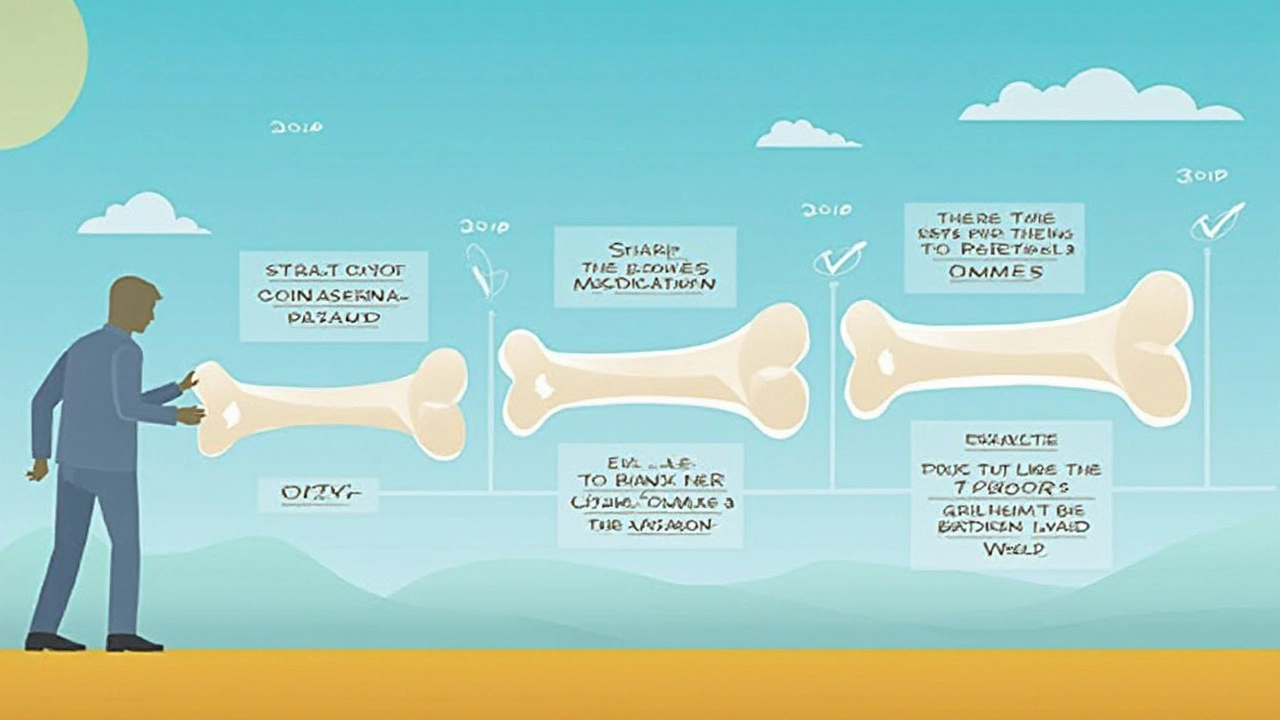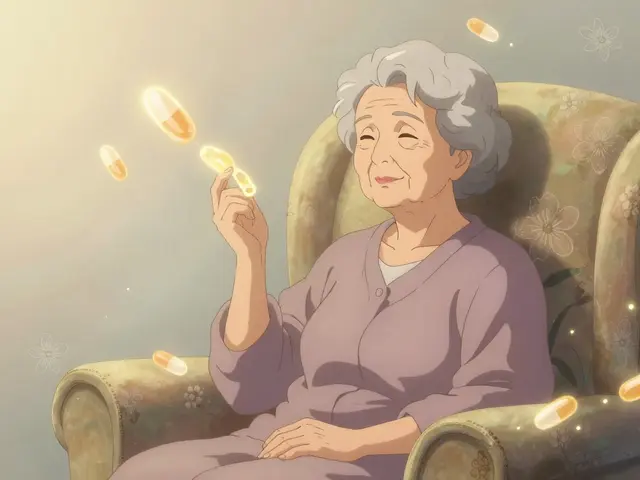
Ever wonder if it’s safe to pause your osteoporosis meds? If you’re on alendronate, you’re not alone. The idea of a 'drug holiday'—taking a planned break from medication—sounds surprising at first. You spend years told to stick to your prescription, then suddenly, your doctor might suggest a break. Not just because you’re tired of pills, but because sometimes pausing can protect you from side effects without putting your bones at risk. Sounds wild? Actually, it’s all about timing, your personal health stats, and keeping an eye on your bones—not just taking a permanent timeout.
Why Drug Holidays Exist: The Reason Behind the Pause
First, let’s talk about why the concept of a drug holiday came about. Alendronate is in a class of drugs called bisphosphonates. These meds are designed to slow down the breakdown of bone in conditions like osteoporosis, mostly to prevent those nasty, life-altering fractures that can land you in hospital. But here’s the twist: after using alendronate for years, your bones keep a memory of the drug. Imagine it as a savings account. You build up a reserve, and even when you stop deposits, you live off the interest for a while.
Alendronate binds to bone tightly and sticks around way after you stop taking it. Research out of the Fracture Intervention Trial (FIT) showed that the positive effects on bone density linger for months, sometimes years.
So why not just go on it for life? The answer’s in the flip side: long-term use brings new risks. There’s the rare but scary chance of atypical femoral fractures (breaks in the thigh bone in unexpected ways) or jaw osteonecrosis (the infamous 'dead jaw'). These complications show up more the longer you use bisphosphonates—especially beyond five years.
That’s where drug holidays step in. After enough time on the meds, you and your doctor might agree to pause—to lock in the bone protection, while lowering the risk of complications. But making that decision isn’t something you just eyeball. It’s all about your T-score and fracture history. And timing is everything.

How Your T-Score and Fracture History Drive the Decision
Let’s get practical. Doctors look at two main things to decide if a drug holiday makes sense for you: your T-score and whether you’ve had any fractures. Here’s how it breaks down:
- T-score: This is a number that shows how your bone density compares to a healthy 30-year-old. A “normal” bone density is a T-score above –1. The closer to zero, the stronger your bones. A T-score between –1 and –2.5 means you have osteopenia (low bone density, but not osteoporosis). Below –2.5 is the osteoporosis zone.
- Fracture history: Any broken bones, especially from minor bumps or falls, mean a lot. A previous hip or spine fracture puts you at way more risk for another break.
So what does this mean for your alendronate schedule? Most endorsements, including those from the American Society for Bone and Mineral Research and other top groups, say: if you’ve been on alendronate for 5 years and your T-score isn’t too low (say, above –2.5), and you haven’t had new fractures, it could be time for a break. On the other hand, if you’re still osteoporotic or you’ve had any new fractures, you should probably stick with the treatment longer (up to 10 years), and only then rethink.
Pausing too soon or for the wrong person can spell trouble. If you have a very low T-score (like –3.0 or worse) or have ever broken your hip or vertebra, your doctor might not recommend a holiday at all. The risk of a devastating break outweighs any benefit of a pause. So, it’s not about just hitting a magic number of years on the meds—it’s about checking your stats and playing the long game.
Check out this table for a quick summary of typical recommendations based on T-score and fracture risk:
| Years on Alendronate | T-score | Fracture History | Holiday? |
|---|---|---|---|
| 5 | > –2.5 | None | Yes, consider holiday |
| 5 | < –2.5 | Any fracture | No, keep using |
| 10 | > –2.5 | None | Yes, strongly consider holiday |
| Any | –3.0 or worse | Hip/Vertebral fracture | No, continue therapy |
Remember: these rules give you a starting point, but your doctor will look at age, other medications, and any risk factors (like if you smoke, drink heavily, or have certain chronic illnesses) before making the final call.

What Happens During a Drug Holiday—and How to Make It Work for You
Okay, so your T-score is stable, no nasty fractures, and it’s been five years on alendronate. You’re a good fit for a drug holiday. What next? This is where things get interesting. 'Holiday' doesn’t mean tossing your prescription in the bin and heading to Fiji. Instead, it means stepping off the meds—but with a plan and regular check-ins.
How long should a holiday last? Most experts suggest 1–3 years, while your doctor keeps monitoring bone density, usually yearly or every other year, with dual-energy X-ray absorptiometry (DXA) scans. If your T-score drops fast, or you break a bone, you go back on meds right away. If you stay stable, you keep the holiday going. Research from the FLEX extension trial showed that after stopping alendronate at 5 years, most people still had decent bone strength for at least 2–3 years—but after that, fracture risk starts sneaking back up, especially for the spine.
What about everyday life? Sometimes, people slack off on lifestyle changes once the pills stop. Don’t make that mistake. Keeping up with calcium, vitamin D, regular weight-bearing exercise (like walking, hiking, or even gardening), and staying off the fags (cigs) and booze—all that matters as much as before. Even though you’re on a holiday, you’re not off-duty!
If you’re ever wondering what the science says, or how long you should pause for your situation, there’s a brilliant breakdown at alendronate drug holiday. Super handy for when you want the details without a trip to the GP.
Pro tip: stay alert for new aches, especially in your thigh or jaw. These can be warning signs—don’t tinker on your own, but call your doctor straight away. Sometimes, people who take long holidays end up needing to restart treatment or swap to different meds (like denosumab or teriparatide), especially if their bones get wobbly.
To wrap up, drug holidays aren’t a lazy shortcut—they’re a tailored, science-backed strategy to manage side effects without ditching bone protection. With your doctor’s help, the right timing, and honest conversations about your risks, you can enjoy that break—and keep those bones going strong.





Jaspreet Kaur
May 26, 2025 AT 07:41So you're telling me my bones remember the drug like it's an ex who still texts at 2am? Wild. I've been on alendronate for 6 years and my doc just said maybe take a breather. Feels like quitting caffeine but for my skeleton. I'm in. Let's see if my hips still hold up without the chemical hug
Gina Banh
May 28, 2025 AT 00:11Stop. Just stop. If your T-score is below -2.5 and you've had a fracture, you don't get a holiday. This isn't a vacation, it's a medical decision. People die from these fractures. Don't be lazy and think 'I'll just pause.' Your bones aren't a phone battery you can turn off.
Deirdre Wilson
May 28, 2025 AT 17:28I love this idea of bones having a memory. Like they're whispering to each other, 'Hey, remember that magic pill? We still got some of that good stuff stashed away.' Makes me feel like my skeleton is this quiet, ancient wizard keeping me upright. I'm gonna start talking to my femur before bed. Goodnight, bone buddy. Stay strong.
Damon Stangherlin
May 29, 2025 AT 14:16Really helpful post! I've been on this for 7 years and was scared to stop. My doctor said I'm a good candidate for a break. I'm gonna keep walking every day and take my D3. Just gotta remember not to slack off even if the pills are in the drawer. Thanks for the clarity!
Ryan C
May 30, 2025 AT 07:54WRONG. The FLEX trial showed that after 10 years, bone density declines significantly in the lumbar spine after discontinuation - not 'after 2-3 years' as implied. Also, atypical femoral fractures are NOT 'rare' - they're 1 in 1,000 after 5+ years. You're downplaying risk. 📉💀
Dan Rua
May 30, 2025 AT 12:11Love how this breaks it down. I'm 68 and on alendronate since 2018. My T-score is -2.3 and no fractures. My doc said 'you're golden for a break.' Feels weird not taking it every week but I'm trusting the science. Also, I've been doing more yoga and it feels amazing. 💪
Mqondisi Gumede
May 30, 2025 AT 22:34Douglas Fisher
May 31, 2025 AT 15:46Thank you for this. I just wanted to say... I'm so glad someone finally explained this clearly. I've been worried about stopping. I didn't know the drug stayed in the bone. And the table? Perfect. I'm printing this out. I'm going to show it to my doctor. I feel less anxious now. Thank you.
Albert Guasch
May 31, 2025 AT 21:57It is imperative to underscore that the discontinuation of bisphosphonate therapy must be predicated upon a comprehensive risk-benefit analysis, incorporating not only T-scores and fracture history, but also comorbidities, concomitant medications, and patient-specific biomechanical factors. A one-size-fits-all approach is both clinically inappropriate and potentially hazardous.
Ginger Henderson
June 2, 2025 AT 05:16So... you're saying I can stop taking this pill and not die? Cool. I'll just do my yoga and pretend I'm fine. 😌
Bethany Buckley
June 4, 2025 AT 02:31How quaint. A 'drug holiday' - as if osteoporosis were a seasonal flu. The very notion is a symptom of our culture's pathological aversion to chronic medical management. Bisphosphonates are not 'drugs' to be cycled like trendy supplements. They are pharmacologic anchors in the architecture of skeletal integrity. 🧬💎
Stephanie Deschenes
June 4, 2025 AT 22:41I've been on alendronate for 8 years. My T-score is -2.1, no fractures. My doctor suggested a break. I'm doing it - but I'm getting DXA scans every 12 months. I'm also taking 1200mg calcium and walking 5K daily. It's not a vacation. It's a pause with purpose.
Cynthia Boen
June 6, 2025 AT 11:26Of course they say 'take a break.' They don't want to keep prescribing. They're tired. You're not special. Your bones don't get a vacation. You're just lazy.
Amanda Meyer
June 7, 2025 AT 16:35I'm conflicted. On one hand, I trust the data. On the other, I'm terrified of breaking something. I'm 72, had a wrist fracture at 65. My T-score is -2.8. I think I should stay on. But I'm scared of jaw necrosis. Can someone who's been through this share? I'm not asking for advice - just... someone else's truth.
Jesús Vásquez pino
June 8, 2025 AT 08:41Wait - so you're telling me I can stop taking this and my bones won't instantly turn to dust? That's it? That's the whole plan? No follow-up? No backup meds? You're gambling with my skeleton and calling it 'science.' I'm not signing up for that.
hannah mitchell
June 9, 2025 AT 08:52I'm on a holiday. 2 years in. T-score still -2.4. No new fractures. I walk every morning. I eat yogurt. I don't stress about it. Just... let the bones do their thing. Quietly.
vikas kumar
June 11, 2025 AT 06:40My uncle in Delhi stopped after 5 years. His T-score was -2.2. He walked, did squats with water bottles, ate almonds. No fracture in 4 years. Maybe it's not just the pill. Maybe it's how you live. Just saying.
Vanessa Carpenter
June 12, 2025 AT 23:24I'm 61, on alendronate since 2017. My doc said I'm a candidate. I'm taking a break. I feel weird not taking it. But I'm also feeling lighter. Like I'm not chained to a pill schedule anymore. I'm still walking. Still eating my greens. Still breathing. That's enough for now.
Bea Rose
June 14, 2025 AT 22:58Stop. Just stop. This is dangerous. You're not a lab rat. Your bones aren't a spreadsheet. This isn't a game. People die from these breaks. You're being irresponsible.